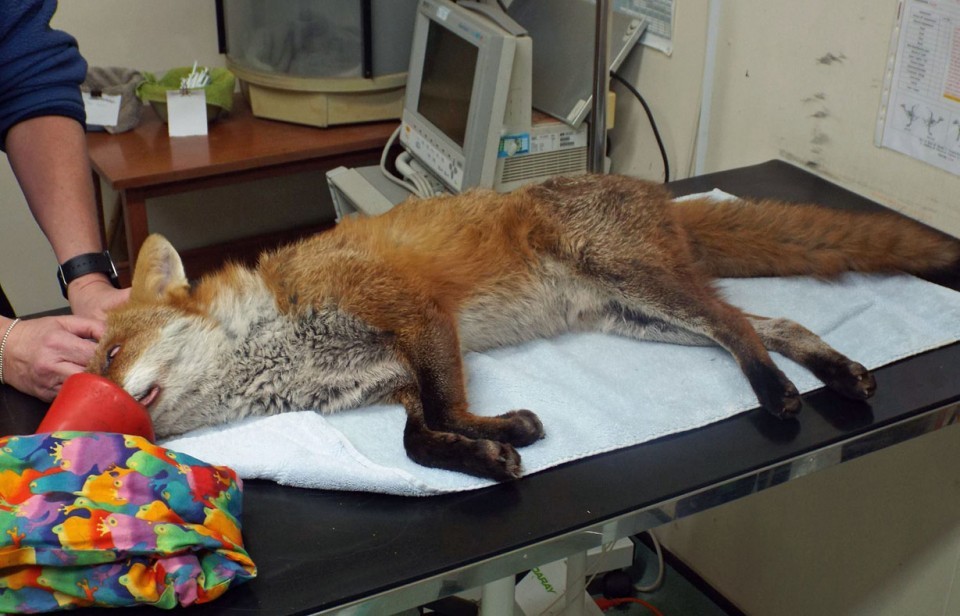Thinking about owning a fox as a pet? It’s a fascinating idea, but can you legally have a fox as a pet in the UK, and is it a good choice for you and the animal? Join PETS.EDU.VN as we navigate the exciting yet challenging world of keeping foxes as pets and provide the knowledge you need to make responsible decisions. This comprehensive guide covers legal aspects, ethical considerations, practical advice, and expert insights, ensuring you’re well-informed. Explore our related articles on exotic animal care, pet ownership responsibilities, and local animal shelters for more in-depth information.
1. The Legal Landscape of Fox Ownership in the UK
Navigating the legal landscape is the first step when considering fox ownership in the UK. It’s important to know the laws and regulations that apply to keeping these animals as pets.
1.1. Dangerous Wild Animals Act: What You Need to Know
The Dangerous Wild Animals Act of 1976 regulates the keeping of certain animal species to ensure public safety. The good news is that foxes (specifically those of the Vulpes genus, which includes the red fox, Vulpes vulpes) are not listed under this act. This means you don’t need a special license to own a fox in the UK.
1.2. Animal Welfare Act 2006: Ensuring Proper Care
Despite not being classified as dangerous, foxes are still protected by the Animal Welfare Act 2006. This act places a duty of care on pet owners to ensure their animals’ needs are met. These needs include:
- A suitable environment
- An appropriate diet
- The ability to exhibit normal behavior
- Housing with or apart from other animals
- Protection from pain, suffering, injury, and disease
Failure to meet these needs can result in fines up to £20,000 and potential prison sentences.
1.3. Protection of Animals Act 1911 and Abandonment of Animals Act 1960
These acts further protect animals from mistreatment. The Protection of Animals Act 1911 makes it illegal to cause unnecessary suffering to any animal. The Abandonment of Animals Act 1960 prohibits abandoning an animal in circumstances likely to cause it unnecessary suffering. These laws ensure that any fox kept as a pet must be cared for properly and cannot be abandoned.
2. Ethical Considerations: Is Keeping a Fox as a Pet Fair to the Animal?
Beyond the legal aspects, ethical considerations play a vital role in deciding whether to keep a fox as a pet.
2.1. Wild vs. Domesticated: Understanding the Difference
Foxes are not domesticated animals like dogs or cats. Thousands of years of domestication have shaped the behavior and temperament of domestic animals to live alongside humans. Foxes, however, retain their wild instincts and behaviors, making them challenging to keep as pets.
2.2. Meeting a Fox’s Natural Needs in a Domestic Setting
It’s difficult to replicate a fox’s natural environment in a typical home. Foxes need ample space to roam, hunt, and explore. Confining them to a house or even a large garden can lead to stress and behavioral problems.
2.3. The Social and Psychological Impact on a Fox in Captivity
Foxes are intelligent and social animals. In the wild, they live in complex social structures and engage in activities that stimulate their minds. Captivity can deprive them of these essential social interactions and mental stimulation, leading to boredom, frustration, and potentially destructive behaviors.
3. Practical Challenges: What It’s Really Like to Live with a Fox
Even if it’s legal and ethically justifiable, owning a fox presents significant practical challenges.
3.1. Housing and Enclosure Requirements
Foxes need secure, spacious enclosures to prevent escape and protect them from potential hazards. These enclosures should include:
- A large outdoor area for exercise and exploration
- A secure den for sleeping and shelter
- Digging areas to satisfy their natural instincts
- Climbing structures for enrichment
Maintaining such an enclosure can be costly and require significant space.
3.2. Dietary Needs and Feeding Habits
Foxes are omnivores with a varied diet that includes meat, fruits, and vegetables. Replicating this diet in captivity can be challenging. Commercial dog food is not suitable for foxes, as it lacks the necessary nutrients. You’ll need to research and prepare a balanced diet that meets their specific needs, which may include raw meat, bones, and supplements.
3.3. Scent Marking and Odor Control
Foxes use scent marking to communicate and establish territory. Their urine and anal gland secretions have a strong, musky odor that can be difficult to control in a domestic setting. Regular cleaning and specialized odor eliminators may be necessary to manage the smell.
3.4. Destructive Behaviors: Digging, Chewing, and More
Foxes are naturally curious and playful, but their behavior can be destructive in a home environment. They may dig, chew, and tear up furniture, carpets, and other belongings. Providing plenty of appropriate toys and enrichment can help redirect these behaviors, but it’s not always effective.
3.5. Veterinary Care: Finding a Fox-Friendly Vet
Not all veterinarians are experienced in treating foxes. Finding a vet who is knowledgeable about fox health and willing to provide care can be challenging. Regular check-ups and vaccinations are essential to keep your fox healthy, but they may be more expensive than for domestic animals.
4. Health and Welfare: Common Issues in Pet Foxes
Keeping a fox healthy and happy requires understanding the common health issues that affect them in captivity.
4.1. Common Diseases and Parasites
Foxes are susceptible to various diseases and parasites, including:
- Canine distemper: A highly contagious viral disease that affects the respiratory, gastrointestinal, and nervous systems.
- Parvovirus: A severe viral infection that causes vomiting, diarrhea, and dehydration.
- Rabies: A deadly viral disease that affects the nervous system.
- Fleas, ticks, and mites: External parasites that can cause skin irritation and transmit diseases.
- Heartworm: A parasitic worm that lives in the heart and blood vessels.
Vaccinations and preventative medications are crucial to protect your fox from these threats.
4.2. Nutritional Deficiencies and Obesity
Improper diet can lead to nutritional deficiencies and obesity in pet foxes. Ensuring a balanced diet with the right vitamins and minerals is essential for their health. Monitoring their weight and adjusting their food intake can help prevent obesity.
4.3. Behavioral Problems Due to Confinement
Confinement can lead to behavioral problems such as:
- Stereotypic behaviors: Repetitive, purposeless behaviors like pacing or circling.
- Aggression: Increased irritability and aggression towards humans or other animals.
- Self-harm: Behaviors like excessive grooming or biting that can cause injury.
Providing ample space, enrichment, and social interaction can help prevent these problems.
4.4. Zoonotic Diseases: Risks to Human Health
Foxes can carry zoonotic diseases that can be transmitted to humans, such as:
- Rabies: A deadly viral disease that affects the nervous system.
- Salmonellosis: A bacterial infection that causes diarrhea, fever, and abdominal cramps.
- Leptospirosis: A bacterial infection that can cause kidney and liver damage.
Practicing good hygiene, such as washing your hands after handling your fox, can help reduce the risk of transmission.
5. Socialization and Training: Can You Tame a Wild Fox?
Socializing and training a fox is a complex and challenging process that requires patience, consistency, and a deep understanding of fox behavior.
5.1. The Challenges of Taming a Wild Animal
Foxes are not domesticated animals and retain their wild instincts. Taming a wild fox is a difficult process that may not be fully successful. They may never be as affectionate or obedient as a domestic dog.
5.2. Early Socialization: The Importance of Handling from a Young Age
Early socialization is crucial for pet foxes. Handling them from a young age can help them become more comfortable around humans. However, it’s important to do this carefully and avoid forcing interactions, as this can lead to fear and aggression.
5.3. Training Techniques: What Works and What Doesn’t
Traditional dog training methods may not be effective with foxes. Positive reinforcement techniques, such as rewarding desired behaviors with treats, can be helpful. However, it’s important to be patient and consistent, as foxes may not always respond as expected.
5.4. Potential for Aggression: Understanding Fox Behavior
Foxes can be unpredictable and may exhibit aggression, especially if they feel threatened or confined. Understanding fox behavior and recognizing signs of stress can help prevent aggressive incidents. It’s important to supervise interactions with children and other pets carefully.
6. Alternatives to Pet Ownership: Supporting Foxes in Need
If you’re passionate about foxes but can’t provide the care they need as pets, there are other ways to support them.
6.1. Supporting Wildlife Rescue Centers and Sanctuaries
Wildlife rescue centers and sanctuaries provide care for injured, orphaned, and abandoned foxes. Supporting these organizations through donations or volunteering can make a big difference in the lives of these animals.
6.2. Sponsoring a Fox: Providing Financial Support
Many wildlife centers offer the opportunity to sponsor a fox. Your financial support can help provide food, shelter, and veterinary care for a specific animal.
6.3. Volunteering at a Local Wildlife Rehabilitation Center
Volunteering at a wildlife rehabilitation center is a rewarding way to help foxes in need. You can assist with feeding, cleaning, and providing enrichment for the animals.
6.4. Educating Others: Raising Awareness about Fox Conservation
Educating others about fox conservation and the challenges they face in the wild can help raise awareness and inspire action. Share information with your friends, family, and community to make a difference.
7. Rescue Stories: The Reality of Abandoned Pet Foxes
Unfortunately, many pet foxes are abandoned when their owners realize they can’t provide the care they need. These rescue stories highlight the importance of careful consideration before taking on a fox as a pet.
7.1. Case Studies of Foxes Rescued from Unsuitable Homes
Rescue organizations often share stories of foxes rescued from unsuitable homes. These stories illustrate the challenges of keeping foxes as pets and the importance of providing appropriate care.
7.2. The Impact of Imprinting on Rehabilitation
Imprinting is a process where young animals form strong attachments to their caregivers, often of a different species. Imprinted foxes may have difficulty adapting to life in the wild and may need to spend their lives in captivity.
7.3. The Importance of Responsible Pet Ownership
These rescue stories underscore the importance of responsible pet ownership. Before taking on any animal, it’s crucial to research their needs and ensure you can provide the care they require.
8. Expert Opinions: Insights from Wildlife Professionals
Hearing from wildlife professionals provides valuable insights into the complexities of fox ownership.
8.1. Quotes from Wildlife Rehabilitators and Veterinarians
“Keeping a fox as a pet is a huge commitment that many people underestimate,” says Caroline Vale, founder and manager of Vale Wildlife Hospital. “They require specialized care and a deep understanding of their unique needs.”
Veterinarian Dr. Sarah Jones adds, “Foxes are not domesticated animals and can be very challenging to treat in a clinical setting. It’s important to find a vet who is experienced in wildlife medicine.”
8.2. The Potential for Behavioral Issues in Captive Foxes
Experts agree that captive foxes are prone to behavioral issues due to their wild instincts and the limitations of a domestic environment.
8.3. The Ethics of Keeping a Wild Animal in Captivity
Wildlife professionals often question the ethics of keeping a wild animal in captivity. They argue that it’s crucial to prioritize the animal’s welfare and ensure they can live a fulfilling life.
9. The Rise of Domesticated Foxes: A Different Perspective
While wild foxes are not suitable pets, there’s a growing interest in domesticated foxes, particularly the Russian domesticated fox.
9.1. The Russian Domesticated Fox Experiment
The Russian domesticated fox experiment, started in the 1950s, has been selectively breeding foxes for tameness. These foxes exhibit dog-like behaviors and are more adaptable to living with humans.
9.2. Differences Between Domesticated and Wild Foxes
Domesticated foxes differ significantly from wild foxes in terms of behavior, appearance, and physiology. They are more social, less aggressive, and have physical traits like floppy ears and curly tails.
9.3. Ethical Considerations of Breeding Foxes for Pet Ownership
The ethical implications of breeding foxes for pet ownership are still debated. Some argue that it’s unethical to manipulate animals for human benefit, while others believe it can provide companionship and conservation opportunities.
9.4. Availability and Regulations in the UK
Domesticated foxes are not widely available in the UK, and regulations regarding their ownership may vary. It’s important to research local laws and ensure you can provide the specialized care they require.
10. Responsible Decision-Making: Is a Fox the Right Pet for You?
Ultimately, deciding whether to keep a fox as a pet is a personal one. Here’s a framework for making a responsible decision:
10.1. Assessing Your Lifestyle and Resources
Carefully assess your lifestyle and resources. Can you provide the space, time, and financial resources needed to care for a fox properly?
10.2. Considering the Fox’s Needs and Welfare
Prioritize the fox’s needs and welfare above your own desires. Can you provide an environment that allows them to thrive and express their natural behaviors?
10.3. Researching Local Laws and Regulations
Thoroughly research local laws and regulations regarding fox ownership. Ensure you comply with all requirements and obtain any necessary permits.
10.4. Seeking Expert Advice and Guidance
Seek advice and guidance from wildlife professionals, veterinarians, and experienced fox owners. Learn as much as you can about fox behavior and care before making a decision.
10.5. Being Prepared for a Long-Term Commitment
Be prepared for a long-term commitment. Foxes can live for 10-14 years in captivity, and their care needs may change over time.
Remember, owning a fox is not like owning a dog or cat. It requires dedication, patience, and a willingness to adapt to their unique needs. If you’re not prepared to make that commitment, it’s best to explore other ways to support foxes in need.
Is a fox the right pet for you? Here’s a simple table to help you decide:
| Factor | Wild Fox | Domesticated Fox |
|---|---|---|
| Legality in the UK | Legal, but with significant responsibilities | Regulations may vary, research local laws |
| Ethical Considerations | Significant concerns due to wild nature | Reduced concerns due to selective breeding |
| Housing Needs | Extensive and secure outdoor space | Secure outdoor space, but potentially adaptable |
| Dietary Needs | Varied and specialized diet | Commercial food may be possible with supplements |
| Training Potential | Limited and challenging | Higher, but still requires specialized techniques |
| Veterinary Care | Difficult to find experienced vets | Easier to find vets familiar with domestic animals |
| Behavioral Challenges | High risk of destructive behaviors | Lower risk, but still possible |
| Socialization with Humans | Limited potential for bonding | Greater potential for bonding |
| Overall Commitment | Very high | High |



By carefully considering these factors, you can make an informed decision about whether fox ownership is right for you.
FAQ: Common Questions About Keeping Foxes as Pets
-
Is it legal to own a fox in the UK? Yes, it is legal to own a red fox in the UK without a special license, but you must comply with the Animal Welfare Act 2006 and other relevant legislation.
-
What are the ethical considerations of keeping a fox as a pet? Foxes are wild animals with specific needs that are difficult to meet in a domestic setting. It’s important to consider whether you can provide an environment that allows them to thrive.
-
What are the practical challenges of owning a fox? Challenges include housing, diet, scent marking, destructive behaviors, and finding a fox-friendly vet.
-
What do foxes eat? Foxes are omnivores and need a varied diet that includes meat, fruits, and vegetables. Commercial dog food is not suitable.
-
How do I control the odor of a pet fox? Regular cleaning and specialized odor eliminators may be necessary to manage the strong, musky odor of fox urine and anal gland secretions.
-
Can foxes be trained? Foxes can be trained to a limited extent using positive reinforcement techniques, but they may never be as obedient as domestic dogs.
-
What are some common health problems in pet foxes? Common health problems include canine distemper, parvovirus, rabies, parasites, and nutritional deficiencies.
-
Are foxes dangerous to humans? Foxes can be unpredictable and may exhibit aggression, especially if they feel threatened or confined.
-
What are some alternatives to pet ownership for fox lovers? Alternatives include supporting wildlife rescue centers, sponsoring a fox, volunteering at a rehabilitation center, and educating others about fox conservation.
-
Where can I find more information about fox care? PETS.EDU.VN offers a wealth of information on exotic animal care, pet ownership responsibilities, and local animal shelters. Contact us at 789 Paw Lane, Petville, CA 91234, United States or Whatsapp: +1 555-987-6543. Visit our website at PETS.EDU.VN for more details.
At PETS.EDU.VN, we understand the allure of unique and fascinating pets like foxes. However, we also believe in responsible pet ownership and prioritizing the welfare of animals. Our goal is to provide you with the information you need to make informed decisions and ensure the best possible life for your furry, scaly, or feathered friends.
Ready to learn more about responsible pet ownership and explore the wonderful world of animals? Visit PETS.EDU.VN today and discover a wealth of resources, expert advice, and a community of passionate pet lovers. Whether you’re considering a fox, a dog, a cat, or any other animal, we’re here to help you every step of the way.
Take Action Now
- Explore our website: PETS.EDU.VN
- Contact us: 789 Paw Lane, Petville, CA 91234, United States
- Whatsapp: +1 555-987-6543
Let pets.edu.vn be your trusted guide to responsible and fulfilling pet ownership. Join us today and make a difference in the lives of animals.